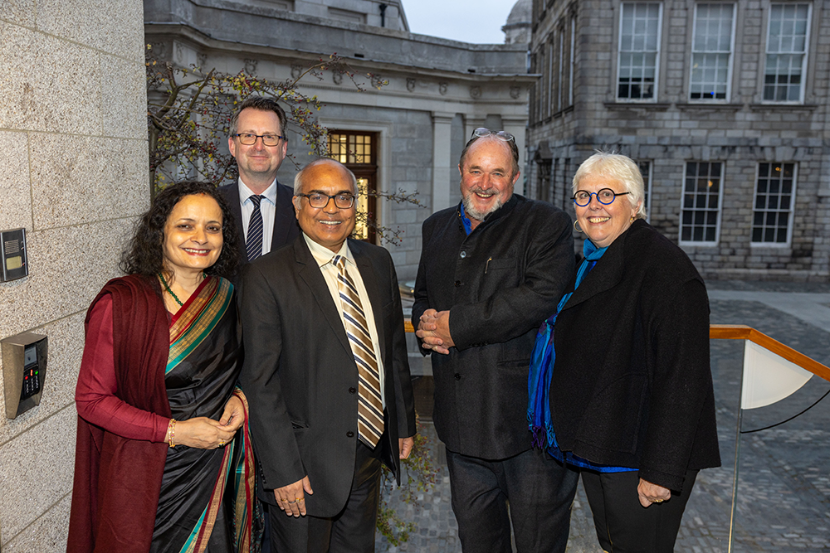Extraordinary story of “world’s first multinational” corporation subject of 2025 Annual Edmund Burke Lecture
Posted on: 20 October 2025
The “complicated battle” between the power of the state and the power of the corporation”, were at the centre of William Dalrymple’s 2025 Annual Edmund Burke Lecture ‘The Anarchy: The East India Company, Corporate Violence, and the Pillage of an Empire.’
Based on his book of the same name, Dalrymple framed the remarkable story of the East India Company within our present-day world where, he said, “corporations have more power than nations.”
Asking “how on earth did one single corporation gather the power to control huge chunks of the world?”, Dalrymple traced the timeline of the East India Company’s rise, where from its “tiny building” in London’s Leadenhall Street the whole of India was enslaved.

Reeti Mishra; Patrick Geoghegan, Director Trinity Long Room Hub; Akhilesh Mishra, Ambassador of India to Ireland; William Dalrymple and Jane Ohlmeyer.
A story of ambition, violence, drugs, corruption and ultimately demise, the East India Company spread its “tentacles across the world”, Dalrymple said, and its “extraordinary story” is the reason he has spent the last twenty years writing about it.
Dalrymple’s books also include 'White Mughals, The Last Mughal', which won the Duff Cooper Prize, and the Hemingway and Kapuściński award-winning 'Return of a King'. His latest book, 'The Golden Road', provides a new history of the diffusion of Indian art, religions, technology, astronomy, music, dance, literature, mathematics and mythology, along a Golden Road that stretched from the Red Sea to the Pacific.
Dalrymple is the co-host with Anita Anand of the hugely successful Empire podcast, telling the story of history through empire. He is also the co-founder and co-Director of the Jaipur Literature Festival which has featured pre-eminent authors Margaret Atwood, Salman Rushdie, and Arundhati Roy. At the Annual Edmund Burke Lecture, Dalrymple announced that the Jaipur Literature Festival would be coming to Dublin for the first time in 2026.
Describing how the East India Company “swallowed the richest country in the world”, Dalrymple said Bengal before British-rule was like the “Silicon Valley” of its day, producing high quality cloth and materials that sold all over the world.
From this to the devasting famine that broke out in 1772, which led to millions of deaths, Dalrymple spoke of the ensuing crisis which laid bare the brutal behaviour of the East India Company back home leading it to “fail spectacularly”.
With fascinating insights into how the East India Company came to such prominence and to such tragic effect, Dalrymple described how the company built up its own “mercenary army” and how through its role in hooking large swathes of the Chinese population on opium, it was able to sell tea around the world.
Edmund Burke’s cameo in Dalrymple’s history of the East India Company comes towards the end of his lecture, when Burke catches on to the corruption of East India Company officials. Burke “goes for the wrong man”, Dalrymple argues but the drawn-out impeachment trial that follows ultimately exposes the role and conduct of the East India Company in empire.
A Trinity graduate and champion for political emancipation, Edmund Burke’s legacy is kept alive through the Trinity Long Room Hub Edmund Burke lectures.
Welcoming guests and His Excellency Akhilesh Mishra, Indian Ambassador to Ireland, to Trinity College Dublin, Director Patrick Geoghegan said the Edmund Burke Lectures are about “reaching out beyond these walls” and showing “how the past very much shapes the present” and the future.
More about the annual the Annual Edmund Burke Lectures:
Edmund Burke (1729-1797) graduated from Trinity College Dublin in 1748. As a student he founded what would later become the College Historical Society, the oldest student society in the world. Burke entered Parliament in 1765 and quickly became a champion for political emancipation. After 1789, he directed his attention to the French Revolution and its immediate ramifications for political stability in England.
One of Burke’s central and life-long concerns was what moral codes should underpin the social order, constrain the use of power and inform our behaviour as responsible citizens. The Edmund Burke lectures provide a prominent forum for contributing in his spirit to the wider discourse about what society we want to live in and what traditions, perspectives and values we need to draw on in the shaping of our future.
Previous lectures in the series were delivered by historian and author Professor Michael Ignatieff; former President of Ireland, Professor Mary McAleese; Pulitzer Prize-winning poet Paul Muldoon; distinguished historian Margaret MacMillan; award winning writer and journalist, Robert Fisk; Professor Roy Foster, Chair of Irish History, University of Oxford; Baroness Onora O’Neill, former chair of the UK’s Equality and Human Rights Commission; renowned historian, Professor Emerita Joanna Bourke; and author and columnist Fintan O’Toole.
The lecture series is supported by the Fallon family in honour of Trinity graduate Padraic Fallon (1946-2012).
Media Contact:
Fiona Tyrrell | Media Relations | tyrrellf@tcd.ie | +353 1 896 3551
Aoife King, Communications Officer | Trinity Long Room Hub | aoife.king@tcd.ie | 01 896 3895
